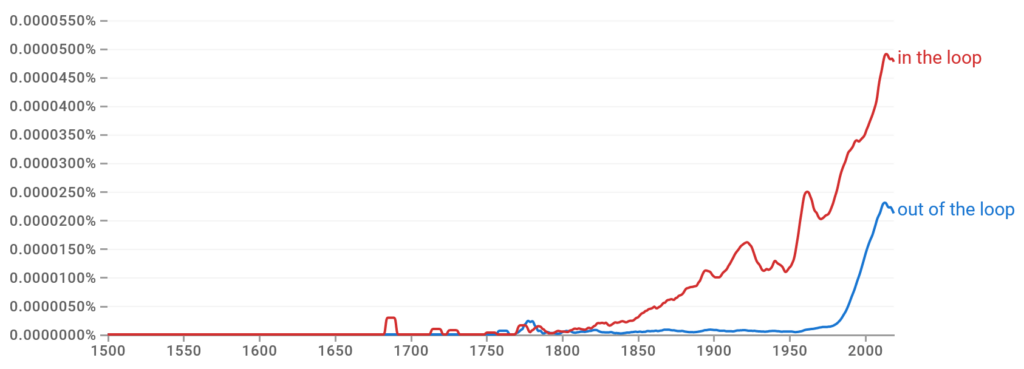Out of the loop and in the loop—a phrase duo where out of the loop signifies being unaware or uninformed, while in the loop denotes being well-informed and included in a particular sphere of knowledge or communication.
Idioms, like out of the loop and in the loop, are special phrases that mean something different from their usual words. They’re like secret codes in everyday talk, helping to create vivid pictures and comparisons. Learning how to use them isn’t just about words; it’s a key to understanding the interesting twists and turns of the English language.
In this article, we delve into the meaning of these idiomatic expressions, uncover their origins, explore related terms and phrases, and guide you on how to use them in different ways. To top it off, we’ve added a fun quiz to test your understanding.
Keep reading to learn how to use these quirky idioms in conversation and written work!

What Does the Idiom Out of the Loop Mean?
The idiom out of the loop means not being informed or included in a certain situation or conversation. On the other hand, the idiom in the loop means being well-informed or included in a particular situation, group, or communication.
According to Collins Dictionary, out of the loop means “not part of a group of people who make decisions about important things, or know about these decisions.” Moreover, the Cambridge Dictionary defines out of the loop as “to have or not have the special knowledge or power that belongs to a particular group of people.”
Imagine coworkers discussing a recent project update during a coffee break. If someone hasn’t been following the project’s progress and feels confused during the conversation, they are out of the loop regarding the latest developments.
Literal Meaning vs. Figurative Meaning
The literal meaning of out of the loop refers to someone physically located outside a circular or closed path. However, the figurative meaning, which is more commonly used, indicates being uninformed, unaware, or excluded from a specific group or situation. In this context, it suggests a lack of knowledge or involvement in certain matters or discussions.
How Is Out of the Loop Commonly Used in Context?
Out of the loop is commonly used when someone is unaware or uninformed about a specific situation, topic, or development in a conversation or group setting. It indicates a lack of knowledge or inclusion in current discussions or events.
Explore the diverse applications of the idiom out of the loop and gain insights into its effective usage. From different contexts to practical examples, the following sections guide you through various ways to seamlessly integrate this expressive phrase into your communication.
What Are the Different Ways to Use Out of the Loop?
Here are a few different ways you can use the idiom:
- Lack of information: “Since I missed yesterday’s meeting, I’m completely out of the loop on the new project details.”
- Unawareness of developments: “Without internet access, I was out of the loop regarding the breaking news during my flight.”
- Not updated on recent changes: “Being on vacation last week, I’m out of the loop on the recent policy updates in the office.”
- Exclusion from conversations: “As the only team member not attending the workshop, I felt out of the loop during the group discussion.”
Where Can You Find Examples of Out of the Loop?
You can find this idiom used in everyday conversation, as well as many of the following media:
- Literature
- Movies and TV shows
- Songs
- Conversations and personal anecdotes
- Online resources
Here are some examples of the idiom’s use within online journal publications:
Groups that could be affected by a major overhaul of the province’s health system say they are troubled they have been left out of the loop. (The Toronto Star)
During a brief gaggle with reporters at the base, Pence was asked why he seemed “a little bit out of the loop” on major events in the Trump administration. (The Hill Magazine)
What Are Some Tips for Using Out of the Loop Effectively?
Here are some tips for using the idioms out of the loop and in the loop in your writing or daily conversation:
- Know the meaning: These idioms can be used to describe being included or excluded from various situations.
- Use descriptive language: When using these idioms, you can use descriptive language to give your speech color and flair, conveying the meaning of someone’s inclusion or exclusion from a group.
- Be mindful of the audience: These idioms can be used in a work-related setting and among family and friends, although people unfamiliar with the idioms might not understand what you mean.
- Use them in conversational phrases: Incorporate these idioms into conversational phrases or sentences to give your speech a natural flow.
What Is the Origin of the Idiom Out of the Loop?

The terms in the loop and out of the loop are relatively modern idioms that came into wide use in the 1960s and 1970s.
There is some disagreement as to where these idioms originated. Some people say they are an evolution of terms used in aviation to describe the electronic control system of an aircraft. In contrast, others opine that in the loop and out of the loop are derived from a military term, command-and-control feedback loop, which describes the system of officers giving orders to enlisted men and enlisted men reporting back to the officers.
How Did the Idiom Evolve Over Time?
Over time, these phrases evolved separate, contrasting meanings and are still in popular use today, both in casual and professional conversation and in more formal writing.
Today, in the loop means being informed within a group, while out of the loop means being excluded or uninformed within the same group.
What Are Some Related Terms to Out of the Loop?
Here are some related terms to out of the loop that can help you correctly use and define the idiom:

Synonyms
- Uninformed
- Ignorant
- Unaware
- Clueless
- Not in the know
- Not up to speed
- Not in the loop
- Out of touch
- Off the radar
- In the dark
Antonyms
- Well-aware
- Updated
- Well-informed
- Up to date
- In the know
- Connected
- Up to speed
Out of the Loop (In the Loop): Test Your Knowledge!
Choose the correct answer.
Let’s Review
In wrapping up our exploration, we’ve unraveled the intriguing idioms out of the loop and in the loop. From their origins and nuanced meanings to practical applications, these phrases serve as linguistic keys unlocking the doors to understanding inclusion, exclusion, and knowledge dynamics.
Whether you find yourself out of the loop or firmly in it, this journey through idiomatic expressions offers insights into language’s ability to convey intricate social nuances. As you navigate the twists and turns of English idioms, remember that being out of the loop might just be the starting point for a richer, more expressive linguistic journey.
